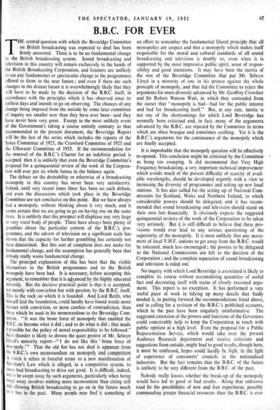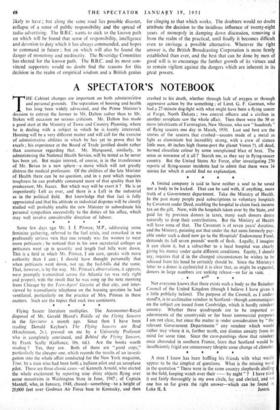B.B.C. FOR EVER
THE central question with which the Beveridge Committee on British broadcasting was expected to deal has been firmly answered. There is to be no fundamental change in the British broadcasting system. Sound broadcasting and television in this country will remain exclusively in the hands of the British Broadcasting Corporation, and listeners are unlikely to see any fundamental or spectacular change in the programmes offered to them in the near future ; and even if there are such changes in the distant future it is overwhelmingly likely that they will have to be made by the decision of the B.B.C. itself, in accordance with the principles which it has observed since its earliest days and intends to go on observing. The chances of any change being imposed from the outside by some later committee of inquiry are smaller now than they have ever been—and they have never been very great. Except in the most unlikely event of the Government's taking a course entirely contrary to that recommended in the present document, the Beveridge Report will be the last of the series which includes the reports of the Sykes Committee of 1923, the Crawford Committee of 1925 and the Ullswater Committee of 1935. If the recommendation for the renewal of the B.B.0 's Charter for an indefinite period is accepted then it is unlikely that even the Beveridge Committee's proposal for a quinquennial review of the work of the Corpora- tion will ever put its whole future in the balance again.
The debate on the desirability or otherwise of a broadcasting monopoly in this country has never been very satisfactory. Indeed, until very recent times there has been no such debate, and even the discussions which took place in the Beveridge Committee are not conclusive on this point. But we have always had a monopoly, without thinking about it very much, and it seems certain that we are going to go on having one on the same basis. It is unlikely that this prospect will displease any very large or very vocal body of people. There have always been plenty of grumbles about the particular content of the B.B.C.'s pro- gammes, and the advent of television on a significant scale has shown that the capacity for further grumbling has certainly not been diminished. • But this sort of complaint does not make for fundamental change, and the assumption has generally been that nobody really wants fundamental change.
The ,principal explanation of this has been that the visible alternatives to the British programmes and to the British monopoly have been bad. It is necessary, before accepting this argument, to remember that it is advanced by the highly educated minority. But the decisive practical point is that it is accepted, not merely with conviction but with passion, by the B.B.C. itself. This is the rock on which it is founded. And Lord Reith, who himself laid the foundation, could hardly have found words more Instinct with conviction, or more careless of contradiction, than those which he used in his memorandum to the Beveridge Com- mittee. " It was the brute force of monopoly that enabled the 13.13.C. to become what it did : and to do what it did ; that made it possible for the policy of moral responsibility to be followed." Such thunder is likely to drown the quiet protest of Mr. Selwyn Llo■cl's minority report—" I do not like this ' brute force of monopoly.' " That the old fire has not died is apparent from the B.B.C.'s own memorandum on monopoly and competition in which it refers in forceful terms to a new manifestation of Gresham's Law which is alleged, in a competitive system, to Cause bad broadcasting to drive out good. It is difficult, indeed, not to be swept away by such arguments, particularly when being swept away involves nothing more inconvenient than sitting still and allowing British broadcasting to go on in the future much as It has in the past. Many people may find it something of an effort to remember the fundamental liberal principle that all monopolies are suspect and that a monopoly which makes itself responsible for the moral and cultural standards of all sound broadcasting and television is doubly so, even when it is supported by the most impressive public spirit, sense of respon- sibility and good intentions. It may have been the inertia of the rest of the Beveridge Committee that put Mr. Selwyn Lloyd in a minority of one in his protest against the whole principle of monopoly, and that led the Committee to reject the arguments for more diversity advanced by Mr. Geoffrey Crowther and Sir Robert Watson Watt, in which they contended from the outset that " monopoly is bid—bad for the public interest and bad for broadcasting itself." But, at any rate, inertia is not one of the shortcomings for which Lord Beveridge has normally been criticised and, in. fact, many of the arguments advanced by the B.B.C. are rejected by the Committee in terms which are often brusque and sometimes scathing. Yet it is the B.B.C.'s arguments for the continuance of the monopoly which are finally accepted.
It is improbable that the monopoly question will be effectively re-opened. This conclusion might be criticised by the Committee as being too sweeping. It did recommend that Very High Frequency broadcasting, a very important technical improvement which avoids much of the present difficulty of scarcity of avail- able wavelengths, should be developed urgently with a view to increasing the diversity of programmes and setting up new local stations. It has also called for the setting up of National Com- missions for Scotland. • Wales and Northern Ireland, to which coif siderable powers should be delegated, and it has recom- mended that sound broadcasting and television should stand on their own feet financially. It obviously expects the suggested quinquennial reviews of the work of the Corporation to be taken very seriously. But it is still difficult to believe that these pro- visions would ever lead to any serious questioning of the superiority of the monopoly. It is most unlikely that any move- ment of local V.H.F. stations to get away from the B.B.C. would be tolerated, much less encouraged ; the powers to be delegated to the National Commissions are left to the decision of the Corporation ; and the complete separation of sound broadcasting and television is ruled out.
No inquiry with which Lord Beveridge is associated is likely to complete its course without accumulating quantities of useful fact and decorating itself with trains of closely reasoned argu- ment. This report is no exception. It has performed a very useful piece of work in tidying up many details that badly needed it, in putting forward the recommendations listed above, and in calling for a revision of the B.B.C.'s published accounts, which in the past have been singularly uninformative. The suggested extension of the powers and functions of the Governors could conceivably help to keep the Corporation in touch with public opinion at a high level. Even the proposal for a Public Representation Service, which would take over the present Audience Research department and receive criticisms and suggestions from outside, might lead to good results, though here, it must be confessed, hopes could hardly be high, in the light of experience of consumers' councils in the nationalised industries. But the fact remains that the B.B.C. of the future is unlikely to be very different from the B.B.C. of the past.
Nobody really knows whether the break-up of the monopoly would have led to good or bad results. Along that unknown road lie the possibilities of new and free experiment, possibly commanding greater financial resources than the B.B.C. is ever likely to have ; but along the same road lies possible disaster, collapse of a sense of public responsibility and the spread of radio advertising. The B.B.C. wants to stick to the known path on which will be found that sense of responsibility, intelligence and devotion to duty which it has always commanded, and hopes to command in future but on which will also be found the danger of monotony and mediocrity. The Beveridge Committee has elected for the known path. The B.B.C. and its most con- vinced supporters would no doubt find the reasons for this decision in the realm of empirical wisdom, and a British genius for clinging to that which works. The doubters would no doubt attribute the -decision to-the insidious influence of twenty-eight years of monopoly in damping down discussion, removing it from the realm of the practical, until finally it becomes difficult even to envisage a possible alternative. Whatever the right answer is, the British Broadcasting Corporation is more firmly established than ever, and the best that can be done by men of good will is to encourage the further growth of its virtues and to remain vigilant against the dangers which are inherent in its great powers.



































 Previous page
Previous page